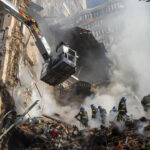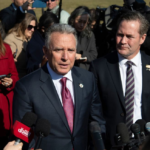Background: Crimea and the War in Ukraine
Ukrainian President Volodymyr Zelenskyy made headlines once again by firmly reiterating that Crimea remains Ukrainian territory, even as international peace negotiations intensify. The comments came during a highly emotional round of talks in London involving Ukraine, the United States, and several European nations aimed at paving a path toward peace in the now three-year-old Russia-Ukraine war.
Zelenskyy reposted a 2018 declaration made by Mike Pompeo, the U.S. Secretary of State under Donald Trump’s first term, which stated: “The United States rejects Russia’s attempted annexation of Crimea and pledges to maintain this policy until Ukraine’s territorial integrity is restored.” This post seemed to underscore a growing concern in Kyiv that the U.S. under Trump might soften its stance on Crimea’s status.
Trump’s Position: A Shift in U.S. Policy?

Former President Donald Trump, who is currently leading the Republican race for the 2024 U.S. election, appeared to signal a significant policy reversal. Trump stated that “nobody is asking Zelenskyy to recognise Crimea,” while simultaneously criticizing the Ukrainian president for fixating on the territory. He later described the London peace talks as having gone “pretty well,” suggesting that an agreement between “two smart people” could quickly end the conflict.
Adding fuel to the speculation of a strategic shift, Trump’s close associate Steve Witkoff, a real estate developer, is scheduled to meet with Russian President Vladimir Putin. The move raised eyebrows about the blending of informal channels into formal diplomatic processes.
Missile Strikes Amid Diplomacy
As diplomatic discussions unfold, violence continues on the ground. Kyiv was hit by missile attacks early Thursday, injuring at least 21 people, including a three-year-old child. In Kharkiv, similar strikes were reported with explosions shaking the city. Ukraine’s military responded by targeting a drone production site in Tatarstan, Russia, believed to manufacture up to 300 long-range drones daily.
Meanwhile, a tragic drone attack on a bus in Marhanets killed nine workers, part of a larger offensive involving 134 drones launched across Ukraine within a single night. These attacks underscore the ongoing humanitarian toll of the conflict, which remains far from resolution.
International Reactions: Allies Reaffirm Support
The canceled visit of U.S. Secretary of State Marco Rubio to the London talks led to speculation about wavering American commitment. However, meetings did proceed between Washington’s Ukraine envoy Keith Kellogg, Zelenskyy’s chief of staff Andriy Yermak, and European security officials. Kellogg later stated that “it’s time to move forward” on President Trump’s directive to prioritize peace and an “America First” strategy.
Despite U.S. ambiguity, key European figures held firm. French President Emmanuel Macron’s office emphasized the importance of Ukrainian sovereignty and its European future. UK Prime Minister Keir Starmer’s spokesperson reiterated that “it has to be up to Ukraine to decide its future.”
What’s at Stake for Crimea?
Crimea remains a highly symbolic and strategic piece of the puzzle in Ukraine’s war with Russia. Its annexation by Moscow in 2014 remains unrecognized by the vast majority of the international community. Zelenskyy has consistently stated that Ukraine’s constitution prohibits ceding any territory, including Crimea.
For many Ukrainians, the idea of surrendering Crimea is not only legally untenable but also morally unacceptable—especially as Russian aggression continues to claim civilian lives. Meanwhile, Trump’s suggestion of recognizing Russia’s hold on Crimea raises significant concerns about the potential erosion of long-standing international norms against the forceful redrawing of borders.
Conclusion
As peace talks attempt to navigate a fraught diplomatic landscape, the debate over Crimea’s status remains one of the most contentious issues. Zelenskyy’s reaffirmation, backed by historic U.S. statements, highlights Ukraine’s resolve not to compromise on territorial integrity. Yet, with political winds shifting, particularly in Washington, the future of Crimea — and the broader peace process — hangs in the balance.
Category: International Politics, Ukraine Crisis
Tags: Ukraine, Crimea, Zelenskyy, Donald Trump, Russia, Peace Talks, Ukraine War, US Foreign Policy, NATO, Marco Rubio









